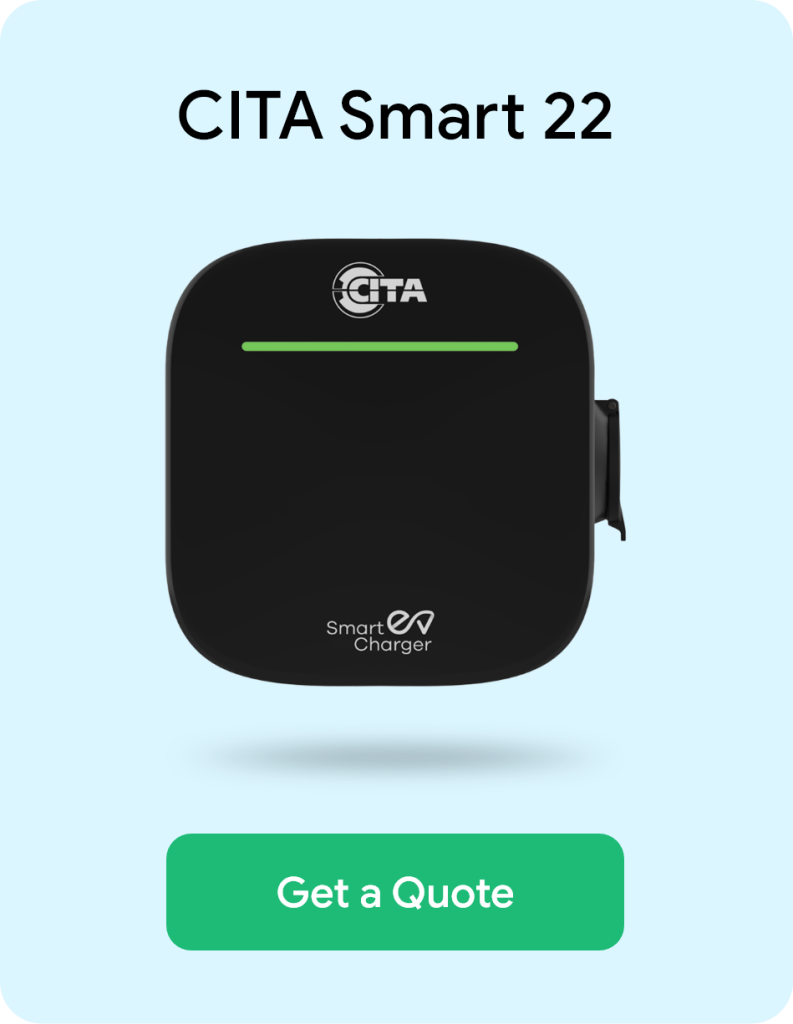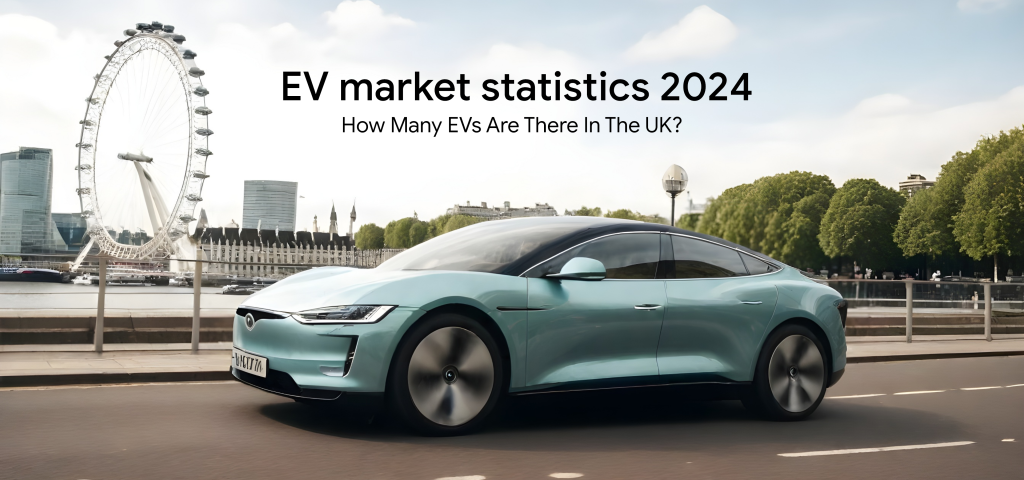This comprehensive guide provides a step-by-step approach to installing an EV charger at home in the UK, empowering individuals to embrace electric mobility with confidence with CITA EV. From assessing electrical capacity to selecting the right charger and ensuring safety, this guide covers essential considerations for a successful home EV charger installation.
Topics
1
Can I install an EV home charger by myself?
2
How does EV home charging work?
3
How much does it cost to charge my EV at home in the UK?
4
How to pick the right EV charger for Home in the UK?
5
Factors to consider before buying an EV Charger for home
6
What can CITA EV offer you?
7
FAQ - EV Charger at Home in the UK
Can I install an EV home charger by myself?
Are you considering making the switch to electric vehicles (EVs) and want the convenience of charging at home?
Home EV charger installation in the UK is a practical and efficient way to ensure your EV is always ready to go. In this comprehensive guide, we will walk you through the step-by-step process of installing an EV charger at home, empowering you to make the transition to electric mobility with confidence with the help of a smart home EV charger.

Installing an EV charger at home in the UK can offer numerous benefits, including the convenience of charging on your own schedule, potential cost savings, and the ability to contribute to a more sustainable future by reducing your carbon footprint. Whether you’re a homeowner or a renter, having an EV home charger can significantly enhance your overall EV ownership experience.
Throughout this guide, we will cover everything from assessing your home’s electrical capacity and selecting the right charger to the installation process and important safety considerations. By the end, you will have a clear understanding of what it takes to install an EV charger at home and be ready to take the next steps toward embracing the future of transportation.
How does EV home charging work?
EV home charging involves utilising a dedicated EV charger at home to replenish the electric vehicle’s battery.
This process allows EV owners to conveniently and efficiently charge their vehicles within the comfort of their own property. The EV charger at home in the UK and anywhere else, serves as the primary interface between the electrical supply and the vehicle, providing a safe and reliable means of charging.
To initiate smart EV home charging, the EV owner typically connects the vehicle to the EV home charger using a charging cable.
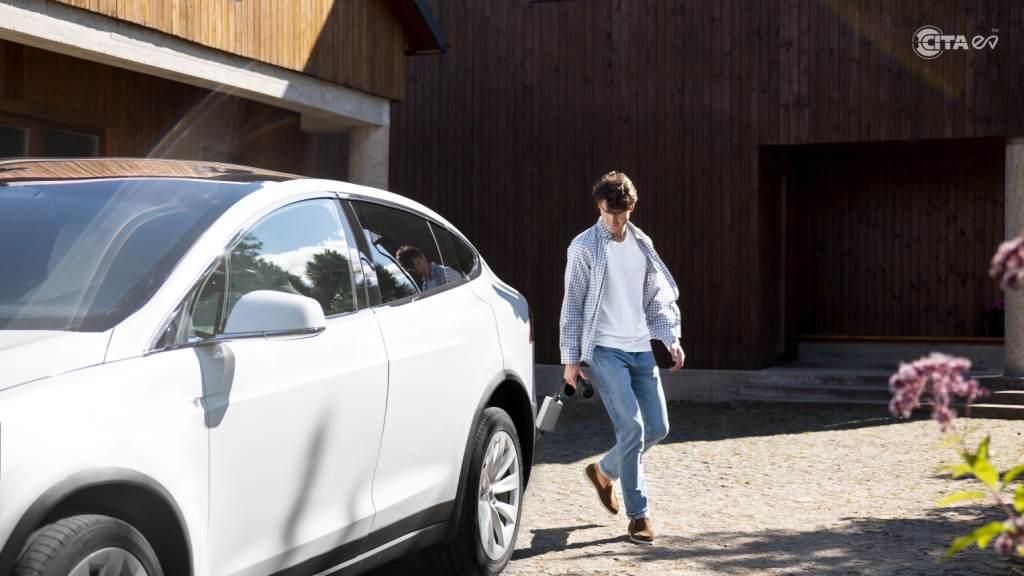
The EV charger at home is designed to communicate with the vehicle, ensuring that the charging process is compatible with the vehicle’s battery system and optimising the charging performance. Many EV home chargers in the UK are equipped with advanced features such as scheduling options and monitoring capabilities, allowing users to customise their charging experience based on their specific needs and preferences.
When the EV charger at home is activated, it delivers electrical power to the vehicle’s battery, gradually replenishing the energy used during driving. The charging rate and time required for a full charge depend on factors such as the vehicle’s battery capacity, the charging infrastructure, and the EV charger’s power output. EV chargers at home are available in various power levels, allowing users to select the most suitable option based on their individual requirements and electrical capacity.
Overall, EV home charging in the UK offers a convenient and efficient solution for maintaining an electric vehicle’s battery levels, providing EV owners with the flexibility to charge their vehicles on their own terms. With the increasing availability of EV chargers at home and advancements in charging technology, the transition to electric mobility is becoming more accessible and seamless for a growing number of consumers.
How much does it cost to charge my EV at home in the UK?
The cost of charging an EV at home is influenced by electricity rates, the efficiency of the EV charger, and the installation expenses, making it essential for EV owners to consider these factors to optimise the cost-effectiveness of home charging.
The Electricity Rates:
Charging an electric vehicle (EV) at home offers a cost-effective and convenient solution for maintaining its battery levels. The cost of EV charging at home primarily depends on the electricity rate and the charging efficiency of the EV charger at home. Utility companies typically measure electricity use in cents per kilowatt-hour (kWh).
The output power for a 32 amp Level 2 home charger ranges between 7 and 19 kW, providing a charging rate of 32 to 35 miles of range per hour.
Installing the right EV home charger in the UK:
To reduce EV charging costs at home, investing in a high-quality Level 2 smart charging station is recommended. Smart chargers, such as the CITA Smart 7 charger, optimise charging times to capture the best cost per kWh, ensuring efficient charging while saving money on the electricity bill. Additionally, charging during off-peak hours when electricity rates are lower can further reduce the cost of charging an EV at home in the UK.
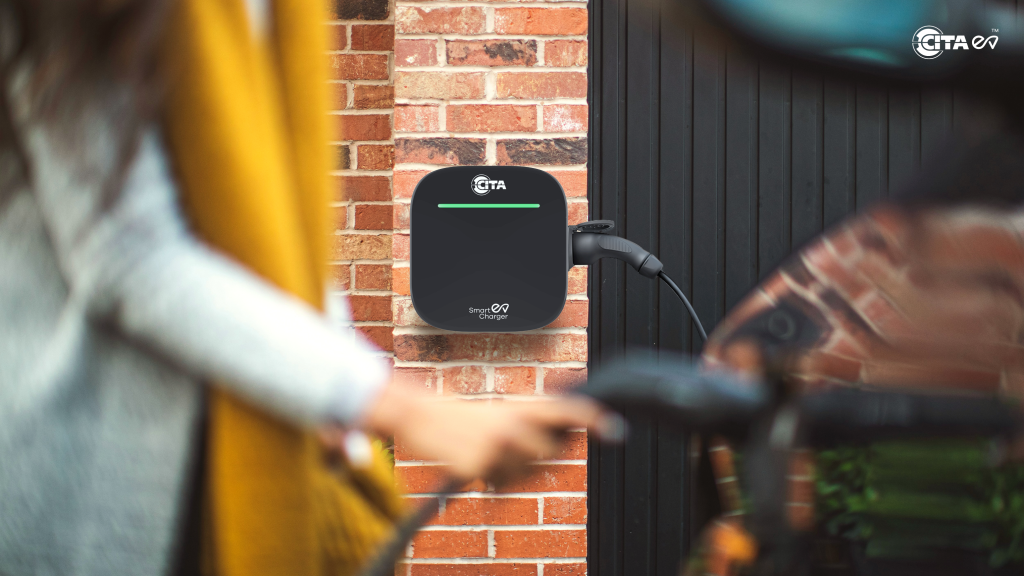
Installation Cost:
The installation cost of an EV charger at home in the UK varies based on factors such as the type of charger, location, and electrical panel requirements. Level 2 charging stations, which are common for home installations, typically cost between $600 to $1,200, with the national average installation cost ranging from $800 to $2,500.
Upgrading to a Level 2 charger and a 240-volt outlet or a 60 amp wall connector may incur a cost of around $1,000, with the highest cost reaching up to $5,000 for installation and circuit panel upgrades.
How to pick the right EV charger for Home in the UK?
When selecting an EV charger for home use, it’s essential to consider several factors to ensure that the chosen charger meets your specific needs and requirements. The market offers a variety of EV chargers designed for residential use, and understanding the options can help you make an informed decision.

2 Factors to consider before buying an EV Charger for home in the UK:
Charging Speed:
Pick an EV Charger for home that aligns with your daily driving patterns and the capabilities of your electric vehicle. EV chargers at home are available in different power levels, typically categorised as Level 1, Level 2, and Level 3.
Level 1 chargers are suitable for overnight charging and are often included with the purchase of an electric vehicle. However, for faster charging, a Level 2 charger is often preferred for home use. These chargers offer higher power output and can replenish an EV’s battery more quickly, making them well-suited for daily charging needs.
Charger-Vehicle Compatibility:
Another crucial consideration is the compatibility of the EV charger with your specific electric vehicle model. Different vehicles may require different charging connectors, so it’s important to ensure that the charger you select is compatible with your EV. Additionally, look for features such as smart connectivity, scheduling options, and monitoring capabilities, which can enhance the convenience and efficiency of EV charging at home in the UK.
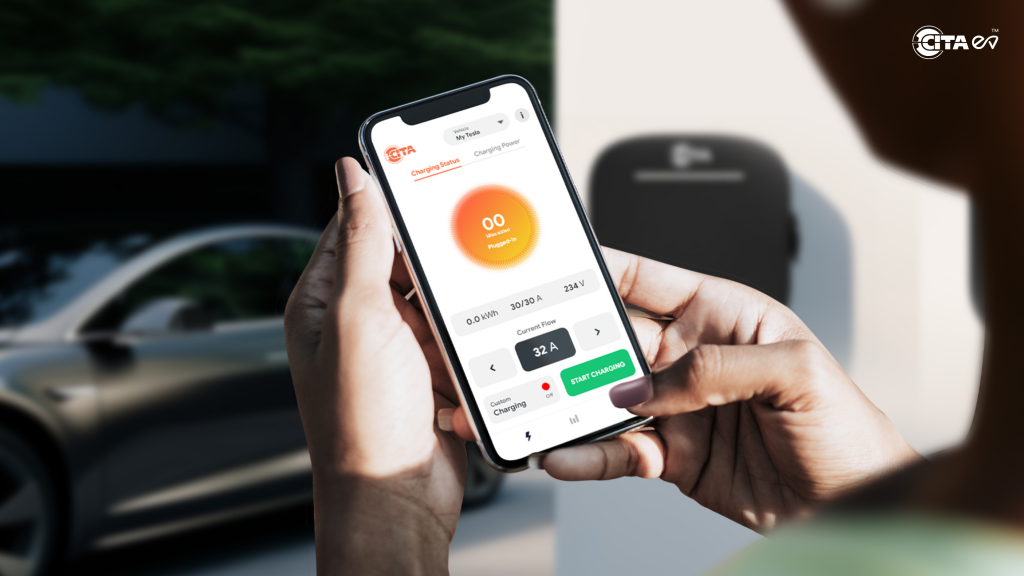
What can CITA EV offer you?
One excellent option for home EV charging in the UK is the CITA Smart EV chargers. CITA offers a range of chargers, including the CITA Smart 7, 11, and 22 kWh chargers.
These chargers are designed to provide efficient and reliable charging for electric vehicles at home.
The CITA Smart 7 KWh:
The CITA Smart 7 charger is a versatile option for residential EV charging, providing a moderate 7 kWh charging capacity. This charger is suitable for EV owners who require a reliable and cost-effective solution for daily charging needs at home. Its compact design and user-friendly interface make it a practical choice for residential charging setups.
The CITA Smart 11 KWh:
For those seeking a faster charging solution, the CITA Smart 11 charger offers an 11 kWh charging capacity, enabling EV owners to replenish their vehicle’s battery more swiftly. This increased charging speed can be advantageous for individuals with higher daily driving requirements or those who prioritise faster charging times.
The CITA Smart 22 Kwh:
The CITA Smart 22 charger stands out as a high-capacity option, ideal for EV owners with larger battery capacities. With a 22 kWh charging capacity, this charger provides a rapid and efficient charging experience suitable for large families and frequent EV car users.
Some notable features of CITA EV’s Home Chargers:

FAQs
EV home charging stations, also known as Level 2 chargers, are the most common type of EV chargers at home in the UK and are often used in residential settings. These chargers are compatible with a wide range of electric vehicles, making them a versatile option for EV owners. Level 2 EV charging, like the CITA EV Smart 7 and 22, is sufficient if you plan on staying at the charging location for at least one or two hours, such as overnight at home.
These chargers can provide up to 25 miles of range per hour of charging, making them a preferred choice for most EV owners as they significantly reduce the time required to recharge their vehicle. However, it’s essential to install a wall box that increases the power coming out of the wall socket to use a Level 2 EV charger at home. CITA EV has a list of certified installers across the country who can help you with the installation process. This installation is typically done by a qualified electrician and can provide a convenient and efficient charging solution for most electric vehicles.
Home EV chargers are designed with numerous safety features to ensure secure and reliable charging for electric vehicles. These EV chargers at home in the UK are equipped to handle higher energy loads safely, promoting efficient and secure charging.
CITA EV Chargers are weather- and impact-proof designs with Ip65 and Ik10 ratings for our products, safeguarding against environmental factors and physical damage.
Furthermore, smart charging features enhance safety and reliability, while rigorous testing and certification processes ensure compliance with industry standards. Overall, the safety of the CITA EV chargers at home in the UK is prioritised through their robust design, smart features, and adherence to stringent testing, providing electric vehicle owners with a secure and trustworthy charging solution.
With a Level 2 EV charger at home in the UK, a fully electric vehicle can be charged to 80% from empty in approximately 4 to 10 hours, while a plug-in hybrid electric vehicle (PHEV) can take 1 to 2 hours for the same level of charge. These estimates are based on the average battery use of 18kWh per 62 miles (100 kilometres) and the charging capacity of the specific charger.
Recommended blogs
EV market statistics 2024 – How many EVs are there in the UK
In the UK, the year 2024 marks a pivotal moment for the electric car market, as the landscape of UK EVs …
How to Install an EV Charger at Home in the UK (2024 Guide)
This comprehensive guide provides a step-by-step approach to installing an EV charger at home in the UK, empowering individuals to …
UK EV Charging Regulations 2024: All You Need to Know
As the demand for electric vehicles (EVs) continues to rise, the UK has been proactive in establishing regulations to ensure …



